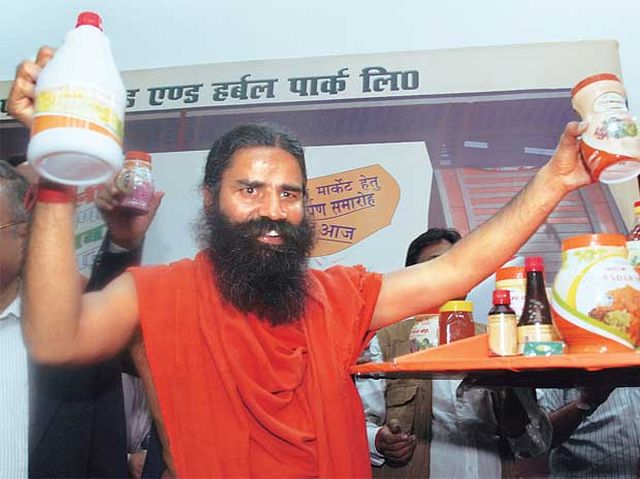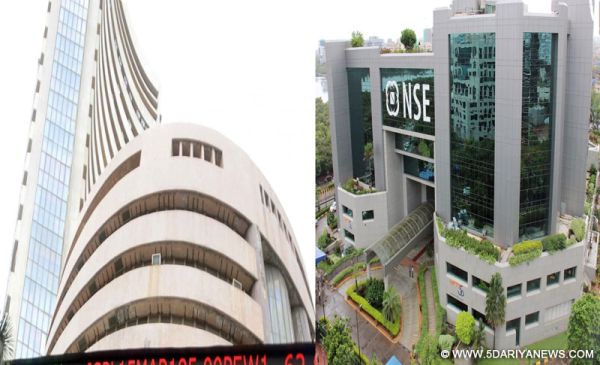
by Editor | May 25, 2021 | Business, Corporate, Corporate Buzz, Large Enterprise, Markets, News
 New Delhi : Riding high on the popularity of desi products, Yoga guru Swami Ramdev said by 2018-19, his fast-moving consumer goods (FMCG) company, Patanjali, will overtake Unilever and others and by 2020-21 Patanjali would become the world’s largest FMCG brand.
New Delhi : Riding high on the popularity of desi products, Yoga guru Swami Ramdev said by 2018-19, his fast-moving consumer goods (FMCG) company, Patanjali, will overtake Unilever and others and by 2020-21 Patanjali would become the world’s largest FMCG brand.
“In the next two years, Patanjali will create Rs 1 lakh crore production capacity. Presently our Haridwar facility has Rs 15,000 crore production capacity and the Tezpur facility has Rs 25,000 crore capacity. Our new facilities are coming up in Noida, Nagpur, Indore and Andhra Pradesh. We have 50 small units where we make edible oils, salt, etc. Even if we attain Rs 1 lakh crore production capacity, it will be hardly 10 per cent of the total market size of Rs 10 lakh crore,” Ramdev told India TV’s Rajat Sharma in the TV show Aap Ki Adalat.
The show will be telecast on Saturday night, according to a press release issued by the channel.
“By 2018-19, Patanjali will overtake Unilever and others as the topmost brand, and by 2020-21 Patanjali plans to become the world’s largest FMCG brand,” he added.
He said he has already prepared a plan of succession for his Rs 10,000 crore Patanjali group, saying that his “successor” will be a team of nearly 500 sadhus trained by him.
The yoga guru, who along with his associate Acharya Balkrishna, has created the massive FMCG group Patanjali within a short span of time, outlined his future plans, while indicating that his group would soon start selling jeans, trousers, kurtas, shirts, suitings, sportswear and yoga wear.
Ramdev also appealed to Finance Minister Arun Jaitley to lower the Goods and Services Tax (GST) on cow ghee and butter, that has been raised from 5 per cent to 12 per cent.
He called for boycott of Chinese and foreign goods, but pushed for export of Indian goods to China and other countries in the same vein.
“The Chinese control almost 50 to 70 per cent of the world market. The Chinese control nearly Rs 20 lakh crore market in India. What is the harm if we try to export our goods to China?”
Ramdev, however, made it clear that the Patanjali group would not try to exploit poor countries. “Whether it is Bangladesh, Nepal, even Pakistan or African countries, whatever profits we will earn, we will not repatriate to India, we will re-invest the money there.”
The yoga guru denied charges that he was getting favours for his group due to his “political connections”.
“I can say with authority that I have not taken a single paisa worth advantage from the Modi government. Nor did I try to obstruct the government’s work. Had I wanted, I could have achieved any dream a politician normally seeks. But for me, politics is not a profession, it’s a mission. I intervened in politics due to exigency (Aaapad dharma) only when I found that bad people (burey log) should not rule any more. I never used, nor will I ever use, my political connections for my company.”
Ramdev said, his Patanjali group has acquired 450 acres of land in Noida by paying Rs 400 crore.
“It was not a gift given to a beggar. I paid 100 per cent for whatever land I bought. In Nagpur, our group paid Rs 25 lakh for setting up an orange juice extraction plant. The government orange juice extraction plant had stopped working. I challenge Unilever, Nestle and others. I am ready to give Rs 12 lakh subsidy, come and set up a plant there.”
The Aap Ki Adalat show with Swami Ramdev was organised at the AIMA convention, and was attended by corporate bigwigs, CEOs of Indian and multinational companies and management experts.
—IANS

by Editor | May 25, 2021 | Business, Commodities, Commodities News, Markets, Networking, Online Marketing, SMEs, Technology
 New Delhi : In a bid to reach out to customers globally, fast moving consumer goods (FMCG) major Dabur India on Tuesday said it has tied up with global e-commerce giant Amazon to launch around 30 products on the platform.
New Delhi : In a bid to reach out to customers globally, fast moving consumer goods (FMCG) major Dabur India on Tuesday said it has tied up with global e-commerce giant Amazon to launch around 30 products on the platform.
The company said under this collaboration, Amazon will help to take around 30 products from its popular range such as Vatika hair oil, Meswak toothpaste, Red toothpaste and Chyawanprash to consumers in the US.
“We are starting with about 30 products… starting with oils, chyawanprash, honey and many others, and soon will be populated with another 80 products which are in the pipeline and are being discussed with the Amazon team and our team locally,” Krishan Kumar Chutani, Executive Director – Consumer Care Business, Dabur India, said here in an interaction with reporters.
Chutani added that the rest of the 80 products will be launched in another six-to-eight months.
According to Dabur India, it will also offer an exclusive range of products specially created for Amazon’s global customers.
—IANS

by Editor | May 25, 2021 | Commodity Market, Economy, Investing, Markets, News
 By Porisma P. Gogoi,
By Porisma P. Gogoi,
Mumbai : Key Indian equity indices — the Sensex and the Nifty50 — rebounded from their five-week lows during the week ended Friday as sentiments were buoyed by easing global geo-political tensions and healthy buying in realty, metal and FMCG stocks.
According to market analysts, despite the reluctance observed in foreign institutional investors (FIIs) to pump in funds, continuous purchasing activities by domestic institutional investors (DIIs) kept the Indian markets afloat.
The indices, however, gave up a bulk of their gains on the last trading day (Friday) in the wake of a major corporate announcement — the resignation of a key managerial personnel at global software major Infosys. The IT sector suffered the most, with the S&P BSE IT index plunging by 369.19 points, or 3.53 per cent intra-day.
On a weekly basis, the 30-scrip Sensitive Index (Sensex) of the BSE gained 311.09 points or 0.99 per cent to close at 31,524.68 points.
Meanwhile, the Nifty50 of the National Stock Exchange (NSE) closed at 9,837.40 points, gaining 126.6 points or 1.30 per cent.
“Markets witnessed a pullback rally this week, although a sell-off on Friday curbed the gains. Sectorally, the top gainers were the realty, metal and FMCG indices, while the top loser was the IT index,” Deepak Jasani, Head of Retail Research, HDFC Securities, told IANS.
Vinod Nair, Head of Research, Geojit Financial Services, said: “This bounce back was led by ease in tensions between North Korea and the US and the Fed’s dovish future outlook. Bargain hunting post healthy correction in mid and small-cap and DIIs inflows supported the up-move.”
Provisional figures from the stock exchanges showed that FIIs sold stocks worth Rs 5,892.1 crore, while DIIs bought scrips worth Rs 4,369.26 crore during August 14-18.
“Markets in Asia were weak on Friday’s morning trade after the Wall Street closed weak amid Trump administration’s inability to follow through economic policy. Strength in the yen against the dollar also weighed on markets,” said Dhruv Desai, Director and Chief Operating Officer of Tradebulls.
“In the Indian markets, as per technical charts, the Nifty has formed a spinning top pattern, which indicates that the bears were not in a mood to give up easily,” said Desai.
On the currency front, the Indian rupee closed the week on a flat note at 64.14 to a US dollar from its previous week’s close.
Figures from the National Securities Depository (NSDL) revealed that foreign portfolio investors (FPIs) divested equities worth Rs 6,804.47 crore, or $1.06 billion, during the week ended August 18.
“Broader markets continued to outperform as mid-caps and small-caps remained attractive to domestic liquidity after the profit-booking spells. Further, a major sell-off witnessed in IT major Infosys due to surprise resignation by Chief Executive Officer (CEO) and terrorist in Europe attack put market in cautious mood,” added Nair.
On Friday, scrips of Infosys plummeted almost 10 per cent, eroding over Rs 22,400 crore in the firm’s market capitalisation (m-cap) at the end of the day’s trade, post the resignation of Vishal Sikka as its CEO and Managing Director (MD). In the process, it pulled down two key market indices by almost one per cent.
Analysts pointed out that the fall in the company’s scrip was the biggest since early 2013. “Infosys shares fell as much as 13 per cent, on way to their steepest intra-day percentage loss since April 2013,” added Desai.
The top weekly Sensex gainers were: Tata Steel (up 3.45 per cent at Rs 625.40), Tata Motors (DVR)(up 3.23 per cent at Rs 227), ITC (up 3.19 per cent at Rs 281.80), Cipla (up 3.06 per cent at Rs 565.70) and Hero MotoCorp (up 2.47 per cent at Rs 3,982.75).
The losers were: Infosys (down 6.05 per cent at Rs 923.10), State Bank of India (down 6.04 per cent at Rs 278.65), Larsen and Toubro (down 2.46 per cent at Rs 1,131), ONGC (down 1.80 per cent at Rs 160.75) and Mahindra and Mahindra (down 1.31 per cent at Rs 1,371.15).
(Porisma P. Gogoi can be contacted at porisma.g@ians.in)
—IANS

 New Delhi : Riding high on the popularity of desi products, Yoga guru Swami Ramdev said by 2018-19, his fast-moving consumer goods (FMCG) company, Patanjali, will overtake Unilever and others and by 2020-21 Patanjali would become the world’s largest FMCG brand.
New Delhi : Riding high on the popularity of desi products, Yoga guru Swami Ramdev said by 2018-19, his fast-moving consumer goods (FMCG) company, Patanjali, will overtake Unilever and others and by 2020-21 Patanjali would become the world’s largest FMCG brand.

